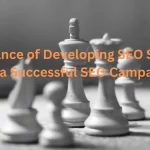Many of us are working as an SEO professional. They provide SEO services. The success of the service depends on the perfect strategy and marketing. In this context, I talked about the difference between SEO strategy and SEO campaign.
Let’s jump into the deep:
What is SEO Strategy?
SEO (Search Engine Optimization) strategy is a comprehensive plan to improve a website’s visibility and ranking in search engine results. We focus on finding easy keywords, and the minimum number of search result pages while developing the strategy.
The key components of SEO strategies are:
Keywords: Picking an easy keyword is the most important point to creating a successful SEO strategy. For example, your focus keywords are hard and difficult to rank. In this case, I always find an alternative and easy keyword. When the easy keywords get ranked, other hard and difficult keywords come forward and our SEO campaign becomes easier.
Competitors Analysis: Competitors analysis plays a vital role in developing a successful SEO strategy. In this segment, we check content structure, quality, internal links, backlinks profiles, technical and image optimization, etc.
We naturally analyze 4/5 competitors’ pages and then develop our own strategy for the campaign.
Importance of SEO Strategy for a Successful SEO Campaign
The importance of an SEO strategy for a successful SEO campaign is paramount. Here’s why:
Guidance and Direction:
An SEO strategy acts as a blueprint that guides all efforts within an SEO campaign. It sets the direction and goals for the campaign, ensuring that all activities align with the broader objectives of the website or business.
Consistency and Cohesion:
A well-defined strategy ensures that all aspects of the campaign, from content creation to technical optimizations and link building, are cohesive and work together harmoniously. This consistency strengthens the overall impact and effectiveness of the campaign.
Long-Term Vision:
An SEO strategy takes into account long-term goals and the bigger picture for the website’s performance. It ensures that short-term campaign efforts contribute to the overarching SEO objectives, providing sustained growth and visibility beyond the immediate campaign timeframe.
Resource Optimization:
With a strategy in place, resources, whether they are time, budget, or manpower, can be allocated more efficiently. It helps in prioritizing activities that will have the most significant impact on the website’s performance in the long run.
Adaptability and Flexibility:
A strategy allows for flexibility in adapting to changes. It’s not rigid but rather adaptable to evolving search engine algorithms, market trends, and user behavior. This ensures that the campaign can be adjusted and optimized as needed for better results.
Measurable Outcomes:
An SEO strategy defines clear, measurable goals. It enables tracking and measurement of the campaign’s success against those predefined metrics, offering insights into what worked and what needs improvement.
Integration with Overall Business Goals:
A well-crafted strategy ensures that SEO efforts align with broader business goals. It’s not just about boosting rankings but also about supporting the business’s overall objectives, whether that’s increasing sales, generating leads, or enhancing brand visibility.
Efficiency and Effectiveness:
Without a strategy, campaigns might end up being disjointed, unfocused, or lacking a cohesive narrative. Having a clear plan in place ensures that every action taken during the campaign is purposeful and contributes to the larger SEO objectives.
In essence, an SEO strategy forms the foundation for successful SEO campaigns. It provides structure, guidance, and a framework that ensures all campaign efforts are aligned, and purposeful and contributes to the long-term success of a website in search engine results.
Also Read:


What is an SEO Campaign?
An SEO campaign is a focused, strategic effort to improve a website’s visibility in search engine results. It involves a series of planned activities and optimizations aimed at achieving specific SEO goals. Here’s a detailed breakdown of what an SEO campaign typically involves:
Goal Setting:
The campaign begins with defining clear, measurable objectives. These might include increasing organic traffic, improving keyword rankings, enhancing brand visibility, or boosting conversions.
Audience and Keyword Research:
Understanding the target audience’s behavior and preferences is crucial. Keyword research helps identify the terms and phrases your audience uses in search queries. This research guides content creation and optimization efforts.
On-Page Optimization:
This involves optimizing individual web pages to improve their search engine rankings. It includes elements such as meta tags, headings, content, URLs, and internal linking, all geared toward relevance and usability.
Content Strategy and Creation:
Creating high-quality, engaging, and relevant content is a significant part of an SEO campaign. This content should align with the audience’s needs and preferences and be optimized for targeted keywords.
Technical SEO:
Ensuring that the website is technically sound is essential. This involves optimizing site speed, mobile responsiveness, and site architecture, and addressing issues that might affect crawlability and indexing by search engines.
Link Building:
Acquiring high-quality backlinks from authoritative websites is a crucial part of the campaign. This involves outreach, content marketing, guest posting, and other strategies to attract relevant and reputable links.
Monitoring and Analysis:
Throughout the campaign, it’s essential to continuously monitor performance using tools like Google Analytics and Google Search Console. This helps in understanding user behavior, tracking keyword performance, and making informed adjustments to the strategy.
Adaptation and Iteration:
SEO campaigns require constant adjustments. Search engine algorithms evolve, user behaviors change, and competitive landscapes shift. It’s essential to adapt the strategy based on the campaign’s performance and changing trends.
Reporting and Evaluation:
Regular reporting and evaluation help in understanding the impact of the campaign. Analyzing the results against the initial goals allows for refinement and improvement of future campaigns.
Integration with Overall Marketing Strategy:
An SEO campaign works best when it’s aligned with broader marketing strategies. Integrating SEO efforts with other marketing initiatives ensures consistency in messaging and a unified brand presence.
An SEO campaign is an ongoing, dynamic process that requires dedication and consistent effort. Its success depends on understanding the audience, creating valuable content, and adapting to the ever-changing digital landscape.
Also Read


Importance of SEO Strategy for Business Success
The importance of an SEO strategy for business success is significant due to its impact on various aspects:
Enhanced Online Visibility:
An effective SEO strategy ensures that your business appears prominently in search engine results. This visibility is crucial in a digital age where consumers heavily rely on search engines to find products, services, and information.
Targeted Traffic:
SEO strategies aim to attract the right audience. By optimizing for specific keywords and search queries, businesses can draw in users who are actively seeking what they offer, increasing the likelihood of conversions.
Credibility and Trust:
Ranking high in search results often translates to credibility and trust in the eyes of users. A solid SEO strategy can position your business as an authority in its field, fostering trust among potential customers.
Cost-Effectiveness:
Compared to many traditional marketing methods, SEO can be relatively cost-effective. Once your strategy is in place and begins to yield results, the ongoing maintenance and optimization generally require less investment than paid advertising.
Long-Term Growth:
An SEO strategy is focused on long-term success. While it might take time to see significant results, the efforts put into SEO can lead to sustainable growth, making it a valuable investment for the future.
Local Reach and Global Presence:
For businesses with a local focus, local SEO strategies can help capture nearby customers, while global SEO efforts can expand the business’s reach beyond borders, catering to a wider audience.
Insights and Data-Driven Decision Making:
SEO strategies rely on data analysis and tracking. This provides insights into customer behavior, allowing for informed decisions about content, product offerings, and user experience improvements.
Competitive Advantage:
A robust SEO strategy can give businesses an edge over competitors. By consistently optimizing and adapting to changing algorithms, a business can maintain or improve its position in search rankings, staying ahead of competitors.
Integration with Marketing Efforts:
SEO strategies can integrate with broader marketing initiatives, ensuring consistency in messaging and creating a cohesive brand experience across different channels.
Adaptability and Evolution:
A solid SEO strategy is not static. It evolves with changing trends, search engine algorithms, and user behaviors. This adaptability ensures that the business stays relevant and visible in the ever-evolving online landscape.
An effective SEO strategy is integral to a business’s success in the digital realm. It enhances visibility, draws in targeted traffic, builds credibility, and contributes to sustained growth and competitive advantage.
Difference Between SEO Strategy and SEO Campaign
The difference between an SEO strategy and an SEO campaign lies in their scope, duration, and focus. An SEO strategy is the overarching plan that guides all SEO activities and remains ongoing, whereas an SEO campaign is a more focused, time-bound initiative within that strategy, aimed at achieving specific short-term goals. Campaigns are like individual projects within the broader strategy, addressing specific, immediate objectives within a set timeframe.
SEO Strategy:
Scope: An SEO strategy is a broader, long-term plan that outlines the overall approach for optimizing a website’s visibility and performance in search engines.
Duration: It’s a continuous, ongoing plan that doesn’t have a fixed endpoint. It encompasses the fundamental principles and guidelines that dictate the direction and approach of all SEO efforts.
Focus: The focus of an SEO strategy is holistic. It encompasses a wide range of elements, including keyword research, on-page optimization, technical SEO, content strategy, link building, and monitoring performance. It sets the overarching goals and the methods to achieve them.
Example: For instance, an SEO strategy might include objectives like improving website authority, increasing organic traffic, and enhancing overall user experience. It provides the framework for all SEO activities.
SEO Campaign:
Scope: An SEO campaign is a more focused and time-bound initiative within the broader SEO strategy. It’s a specific set of activities aimed at achieving particular short-term goals.
Duration: It’s time-bound and typically has a specific start and end date. It might last a few weeks or months and is designed to achieve specific, measurable outcomes within that time frame.
Focus: A campaign has a narrower focus. It could be centered around a specific product launch, seasonal promotions, content marketing for a particular event, or addressing a specific issue such as site restructuring or a technical overhaul.
Example: For instance, a website might run an SEO campaign focusing on a new product launch, optimizing content and keywords specifically related to that product, and promoting it to boost its visibility for a limited period.
End Words
Developing an SEO strategy is very important for a successful SEO campaign. Without strategy, the campaign will not be successful. On the other hand, without an SEO campaign, the strategy has no value. Both, SEO strategy and campaign walk together parallelly.

